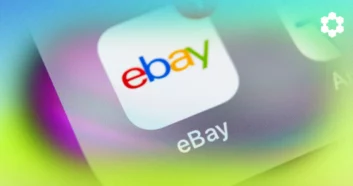As an Amazon seller you’re interested in driving traffic to your listings in the most effective ways possible.
Most shopper searches originate on Amazon itself, meaning your efforts there will be paramount, with actions taken to improve rank, get impressions, clicks, etc.
But what about the next big source of shopper traffic, Google?
Let’s take a look at the distinction between Amazon and Google search, and how each can impact your rank.
Google Search
Searches on Google reach nearly 9 billion each day.
Amazon, while huge, clocks in at less than a hundred million.
As massive as Google seems in comparison, that’s only part of the picture.
When it comes to product searches – the thing in which we as Amazon sellers are most interested – 56% of consumers begin their quest on Amazon. Meaning over half of people “going shopping” online go straight to where we sell.
The bulk of the others, 42%, go to a search engine. The search engine of choice, of course, being Google. With 88% of the search market, Google is dominant when it comes to looking for things.
It makes sense, then, to focus our efforts on these two platforms for customer search.
Harnessing Google
Google is your opportunity to capture those other shoppers who didn’t start on Amazon.
According to industry studies, products that rank on the first page of Google search results for relevant keywords tend to perform better on Amazon.
This is a direct indication of the importance of search engine traffic for improving rank. In fact some sellers report up to a 30% sales boost after optimizing their listings for search engine visibility.
Maximize the profitability of your off-Amazon campaigns through PixelMe. Using high-value keyword optimization and AI-driven technology, PixelMe boosts conversions and enhances return on ad spend.
The Google Leak
Sidebar: A discussion of Google at this point in history should make note of a recent leak that exposed useful info for advertisers.
“Exposed” makes it sound bad, and in many ways it is bad – for Google, anyway, and perhaps others, as information was leaked that gives insight into how Google ranks things – but for those of us doing advertising it’s an opportunity we should not ignore.
Methodologies were revealed that can inform our own advertising and SEO.
Rather than go into the details here, SEO experts, Yoast, did an analysis of the leak and organized their findings into a great piece on implications for existing best practices. It’s worth reviewing.
The Google Leak: insights and implications for SEO best practices • Yoast
Amazon Search
On to Amazon search.
This is where your customer traffic either is or ends up, and as such is the centerpiece of your marketing and ranking efforts.
Search is critical for your product to be found. That sounds obvious to say, and it is, but the absolute importance of working to ensure your product comes to the top in search results can sometimes be neglected.
In order to maximize your product’s results in searches you need to pay attention to things like:
- Competitive pricing
- Review management
- Listing optimization
- Conversion rate
Sales rank on Amazon is relative and doesn’t directly correlate with exact sales figures. It’s a valuable metric for sellers to gauge performance and strategize marketing efforts, with things like sales history and product demand playing a big part.
Understanding these factors as an Amazon seller can help you optimize your product listings and improve visibility on the platform.
Future-proof your business with SellerTools, a full suite of data-backed Amazon automation and research tools designed to improve Amazon search rankings by, among other things, optimizing listings.
So what’s the end-game?
Organic Rank And Why It Matters
The ultimate goal, when it comes to both of these major platforms, Amazon and Google, would be to appear at the top of every search organically with no paid promotion.
A lofty goal indeed.
With that as the peak of all possibilities, Amazon sellers everywhere begin their climb to the summit.
Various factors affect that natural ranking. Among them:
- Sales velocity
- Customer reviews
- Relevance
- Keyword optimization
Organic rank matters because it means you’re coming up when customers search based purely on the value, relevance and rank of your product – not simply because you were willing to pay more than anyone else to be seen.
This matters.
Studies show that over 60% of clicks go to the top three organic search results. Many customers look past those first few “Sponsored” slots to see what’s coming up near the top organically based on their search criteria.
But it’s no small challenge.
Of the first twenty products a shopper first sees, only four are organic results, meaning it’s harder than ever to get your product to appear both naturally and high up the chain in search results.
Securing the highest possible organic rank is, therefore, your Holy Grail.
The Algorithms
Amazon’s algorithm is less complex than Google’s, to a point. It prioritizes product relevance and sales potential.
Google’s algorithm is highly complex, refined through frequent updates. It aims to understand user intent, context, and semantics across a far wider range of search possibilities.
How do you get your Amazon product to be in the suggested products on Google?
Taking dozens of signals into account when determining the best combination of products, Google’s recommendation engine factors in:
- Product viewed
- Related products
- Top performing products
- Audience characteristics
- Customer’s frame of mind
Google has a convenient 2-page PDF which goes into these factors, with tips and info on how to get your products in front of the right audience.
More On The Google Product Recommendation Engine
Our objective with this article has been a high-level overview, pairing an understanding of these two major search engines and the role they play in product rank and, therefore, sales.
Nothing, as you know, stands still.
Where might these two titans of search be headed?
The Future
Reading that heading, we imagine ourselves passing our hand slowly through the air before us, eyes cast as if in rapture to the sky, uttering the words in hushed awe:
“The future!”
What does it hold?
Over the last two years Google has introduced updates including an AI feature.
Things we might expect:
- AI Overviews: this is the AI-generated answers to user queries, offering concise summaries. We should expect to see this further evolve.
- Personalization: Google aims more and more to tailor results to individual preferences.
- Contextual Information: Google’s vision for the future is to use AI to include contextual information, enhancing the user experience and results.
- Transition to a Portal: some believe Google is/will be evolving from a traditional search engine into more of a portal, allowing users to complete tasks without visiting external websites.
In the next decade Google’s search experience will continue to evolve in ways we may not yet even be able to predict, driven by continuing AI innovations.
Amazon
A few trends to keep an eye on:
- Expanded Features for Brand Registry: expect enhancements, including gatekeeping and advanced advertising features.
- Generative AI Search Experience: Amazon is rolling out upgraded generative AI capabilities for a more conversational, detailed and personalized search experience, both on its website and app.
- Permanent Shift to Online Shopping: this trend will continue, with Amazon as the online leader likely seeing continued growth in users and Prime memberships.
As with Google, Amazon’s search is evolving with AI advancements and a focus on user experience.
“Search intent” will more and more become the watchword for the technology and AI behind these major search engines, which is good news for us humans. What is the customer looking for, despite the precise words they chose to use?
Reaching and closing our customers will become more and more natural, even as the systems behind that become more and more advanced.
Grab Those Sunglasses
In short, the future’s so bright we gotta wear shades.
Stay ahead with Carbon6’s industry-leading all-in-one Amazon platform. We help you own your outcomes so you can simplify your success.




